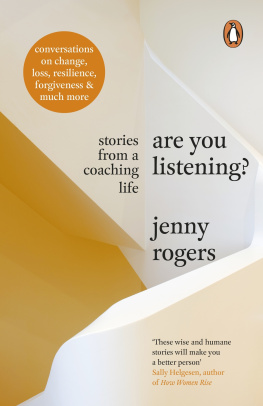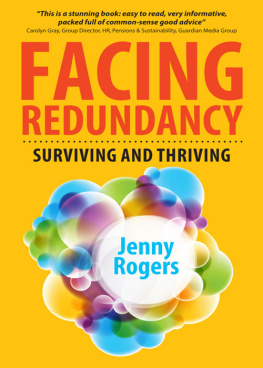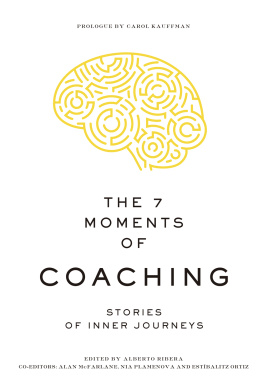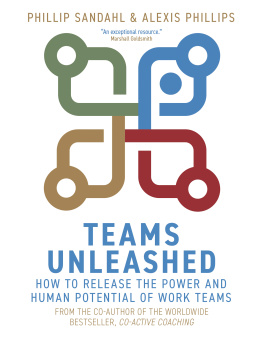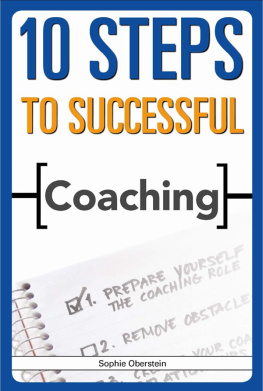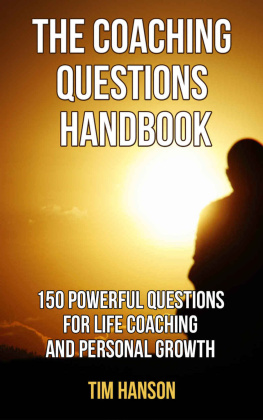

Jenny Rogers
Are You Listening?
Stories from a Coaching Life

Contents
About the Author
Jenny Rogers is one of the UKs most experienced and well-known coaches who, in addition to her coaching practice, trains coaches all over the world. In 2019 she won the Henley Business School Award for Outstanding Contribution to Coaching. Her clients include chief executives and directors of some of the UKs most successful organizations. Her book Coaching Skills: The Definitive Guide to Being a Coach is acknowledged internationally as the Bible on how to coach successfully.
In Memory of Alan
Every coach and leader needs to read this book! Filled with engaging, impactful stories, Are You Listening? looks behind the curtain at coaching sessions with high level executives. Learn how to fuel your success with your failures and share in the struggles and triumphs of real leaders Marshall Goldsmith, Thinkers 50 #1 Executive Coach and only two-time #1 Leadership Thinker in the world
Jenny Rogers cherishes the core of truth in each of us. Are You Listening? takes us with her as she brings people back to that core. When you finish the book, you will see people differently. Not many gifts are for ever, but that one is Nancy Kline, bestselling author of Time To Think
Are You Listening? is quite simply the best book about coaching I have ever read. Its about the real experience of coaching, rather than a new-and-improved template or method, so it gets right down to the tangled complexities of human exchange and growth. Jennys wise and humane stories will make me a better person Sally Helgesen, author of How Women Rise, The Female Advantage and The Web of Inclusion
Jennys coaching was life-changing in my early career and I have never forgotten her rare combination of attention, rigour and wry humanity. Her beautifully written book is fascinating about the challenges of being human and the revelatory power of great coaching Helen Boaden, Former Director, BBC Radio
Jenny Rogers effectively invented the art of executive coaching, and shes certainly done more than anyone to advance and professionalize it. Her remarkable new book inhabits a place between fiction, non-fiction and memoir. Its The Examined Life, Kitchen Table Wisdom, Its All in Your Head, Do No Harm, Loves Executioner and Let Me Not Be Mad all rolled into one. Its a revealing look back on three decades of fascinating encounters, an honest examination of the big questions that make us all tick and, above all, a generous, wise and incredibly moving testament to the power of compassion, acceptance and change Oliver Rawlins, Vice President of Communications, Netflix
Jenny Rogers has done for coaching what Irving Yalom did for therapy: written a book full of moving stories that show the process and the benefits John-Paul Flintoff, author of A Modest Book About How to Give An Adequate Speech
Compelling and compassionate, comprehensive and challenging, the eighteen beautifully written client histories show that coaching is concerned with big questions of love, authenticity, self-worth, autonomy, isolation, life-purpose and death. Coaching is about listening with exquisite attention, offering acceptance, challenge and kindness Dr John Raftery, former Vice Chancellor, London Metropolitan University
Introduction
I have worked as a coach for three decades after earlier careers in teaching, television, publishing, management and consultancy. Mostly what I do is executive coaching, meaning that I work with people in senior roles and their organizations pay the bill. They come for two-hour sessions, typically every few weeks over an eight-month period or more. Sometimes I work with the same client for several years off and on and through a number of different jobs, so we get to know each other well.
Coaching is not therapy although therapy is a close cousin. My clients are mostly functioning well. If they have a mental health problem it will tend to be a minor one. If it is more than minor, and sometimes it is, then they need a different kind of help. The coaching I do, as with most executive coaches, is not about passing on my supposed wisdom through advice. If you rush to advise or rescue a client, you stop listening and you miss what you need to hear. Nor is it about being nice and nodding along to everything the client says. The art of coaching is to ask an astute question rather than to have a clever answer. Sometimes coaching is not about being nice at all because straight talking is what the client needs. Executive coaching is occasionally described as performance coaching by the organizations who commission it, but that does the process an injustice. The whole person is always there and the rest of a clients life is always on the agenda one way or another.
My role is to provide a rare opportunity for people to be vulnerable, to talk through what is really bothering them, to know that there is no report-back to their organizations and that, unlike almost everyone else in their lives, I am suspending judgement. It is an opportunity to take off the mask, to be seen as you really are without the stage clothes and disguises that most of us feel we have to adopt in order to protect ourselves. In doing this I am providing a quiet place where clients can look inwards as well as outwards, soberly assessing what matters to them and the decisions they need to make. My aim is that they will find acceptance that demands nothing in return. I describe this to them as being neutral but not neutered, unattached not detached, friendly but not a friend.
All coaching is about change. If nothing needs to change then you dont need a coach. But the bigger the change, and the more we know we need to embrace it, the more reluctant we can be to do so and the longer it takes. Fear is what holds us back. Clients could be in a successful career, but they may have suddenly lost their zest and have no idea where to go next. They may have been fired from a high-profile job and be the focus of press attacks or social media trolling. They may secretly wonder if they are good enough despite their appearance of uncrackable confidence. They may feel trapped in a failed marriage. They may be facing one of those dilemmas that involves a tempting offer where to accept would be to betray intensely held values. They may be nursing a secret which cannot be confessed because of its potential to humiliate and expose. They may have made a devastating mistake or have experienced a crushing disappointment while pretending to the rest of the world that everything is fine.
The foundation precept of coaching is that we have choice because we are responsible for ourselves. Other people cannot make us happy or unhappy. This idea can be terrifying, which perhaps is why some of us try to dissolve the oppressive anxiety it creates through addictions or by passing the responsibility for our well-being on to gods or demagogues. Few of my clients now have any religious faith but many start with the belief that what needs to change is other people, yet they discover through coaching that the only person you can ever reliably change is yourself and that can be arduous.
Clients often begin by giving me what I think of as their cover story. This is something safely small, usually to do with the surface discomforts of life in their organization, though it may be convincingly presented as urgent and important. A good example would be the many people who say they are overwhelmed by their work, there are too few hours in the day, they are appallingly busy, people pester them, they are obliged to deal with their emails even when they are on holiday. The cover story is part of what has helped the client function. It is what the psychologist Professor Franz Ruppert calls the survival self and its job is to distract and protect. At some level the client is testing you: will you swallow the cover story? If you do, they may abandon the coaching, telling their friends and colleagues that you are useless. The real job of a coach is to enable the client to move from the cover story to the underlying story and to find a healthy way of answering the big questions that they may have been avoiding so skilfully for so long.
Next page
